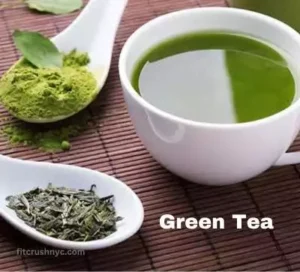Green tea, a beverage celebrated for centuries, has gained immense popularity in the quest for a healthier lifestyle. Beyond its rich cultural significance, green tea is now recognized for its potential to aid weight loss. This article delves into the science, selection, and strategies to harness the benefits of the best green tea for weight loss.
The Science Behind Best Green Tea for Weight Loss
Best Green Tea for Weight Loss contains powerful antioxidants known as catechins, particularly one called epigallocatechin gallate (EGCG). These compounds have been studied for their ability to boost metabolism and facilitate fat burning in the body.
How Green Tea Can Help You Lose Weight
Best Green Tea for Weight Loss contains several compounds that can promote weight loss, including:
- Caffeine: Caffeine is a stimulant that can boost your metabolism and help you burn more calories.
- Catechins: Catechins are a type of antioxidant found in green tea that has been shown to increase fat burning and reduce belly fat.
- EGCG: EGCG (epigallocatechin gallate) is a particularly potent catechin that may help break down fat and prevent the formation of new fat cells.
In addition to these compounds, green tea may also help you lose weight by:
- Increasing satiety: Green tea can help you feel fuller for longer, which can reduce your calorie intake.
- Improving insulin sensitivity: Green tea can help your body use insulin more efficiently, which can lead to lower blood sugar levels and reduced fat storage.
- Boosting exercise performance: Green tea may help you exercise for longer and burn more calories during your workouts.
The Best Types of Green Tea for Weight Loss
Not all green teas are created equal. Some types of the Best Green Tea for Weight Loss are higher in catechins and caffeine than others, making them more effective for weight loss. Here are a few of the best types of green tea for weight loss:
- Matcha: Matcha is a type of green tea powder made from whole tea leaves. It is one of the highest sources of catechins and EGCG, making it a great choice for weight loss.
- Sencha: Sencha is a popular Japanese green tea that is known for its grassy flavor. It is a good source of catechins and caffeine.
- Gyokuro: Gyokuro is a shade-grown green tea that is high in catechins and has a smooth, umami flavor.
- Bancha: Bancha is a type of green tea made from the later-harvested leaves of the tea plant. It is lower in caffeine than other types of green tea, but it is still a good source of catechins.
Choosing the Right Best Green Tea For Weight Loss

Choosing the right green tea for weight loss involves considering factors such as the type of green tea, its origin, flavor profile, and your personal preferences. Here are some tips to help you make the right choice:
-
Tea Type:
- Sencha: This is the most common type of Japanese green tea, known for its grassy and slightly sweet flavor.
- Matcha: A powdered green tea with a rich, earthy taste. It’s often used in traditional Japanese tea ceremonies.
- Dragonwell (Longjing): A popular Chinese green tea with a smooth and nutty flavor.
- Gunpowder: Chinese green tea with a stronger flavor, often used in Moroccan mint tea.
-
Origin:
- Japanese Green Tea: Typically has a vibrant green color and a fresh, grassy taste.
- Chinese Green Tea: Varies widely in flavor, from delicate to bold, depending on the region.
-
Grade:
- Higher grades often have a more delicate flavor and are produced from the youngest leaves. Look for terms like “sencha,” “your,” or “fine pluck” for higher-quality teas.
-
Flavor Profile:
- Consider the flavor notes you prefer. Some green teas have a more vegetal taste, while others are floral, nutty, or even fruity.
-
Caffeine Content:
- Green tea generally contains less caffeine than black tea, but the exact amount can vary. If you’re sensitive to caffeine, you might want to choose a milder green tea or opt for decaffeinated versions.
-
Packaging:
- Look for teas packaged in a way that protects them from light and air, as these can degrade the quality of the tea over time. Sealed pouches or tins are often better than clear plastic containers.
-
Freshness:
- Fresher tea generally has a more vibrant flavor. Check for the harvest date if available, or choose a reputable brand known for high-quality, fresh teas.
-
Brewing Instructions:
- Different green teas require different brewing temperatures and times. Make sure you’re comfortable with the recommended brewing method for the specific type of tea you choose.
-
Price:
- While higher-quality teas may be more expensive, they often provide a more enjoyable and nuanced flavor. Balance your budget with your preferences.
-
Personal Preference:
- Ultimately, the best green tea is the one you enjoy the most. Experiment with different types and brands to find the one that suits your taste.
Incorporating Green Tea into Your Routine
Discover the best times to drink green tea to maximize its effects. Coupled with a healthy lifestyle, green tea becomes a potent ally in your weight loss journey.
How to Drink Green Tea for Weight Loss
To get the most weight loss benefits from green tea, it is important to drink it regularly. Aim for 2-3 cups per day. You can drink green tea hot or cold, and you can add flavor with natural ingredients like lemon, ginger, or honey.
Here are a few additional tips for using green tea for weight loss:
- Choose loose-leaf tea over tea bags. Loose-leaf tea is generally higher in quality and has more antioxidants.
- Steep your tea for the recommended amount of time. Overstepping your tea can make it bitter and less effective.
- Avoid adding sugar or milk to your tea. These will add calories and negate the weight loss benefits.
It is important to note that green tea is not a magic bullet for weight loss. It should be used in conjunction with a healthy diet and regular exercise.
In addition to the types of green tea listed above, many other herbal teas may also be helpful for weight loss. These include:
- Oolong tea: Oolong tea is a type of tea that is partially oxidized between green and black tea. It has a unique flavor and may help boost metabolism and burn fat.
- Hibiscus tea: Hibiscus tea is a tart and refreshing tea made from the hibiscus flower. It may help lower blood pressure and cholesterol levels.
- Peppermint tea: Peppermint tea is a soothing tea that can help aid digestion and reduce bloating.

Green Tea and Exercise
The combination of the Best Green Tea for Weight Loss and exercise can be a potent one, potentially enhancing your workout experience and offering a variety of health benefits. Here’s what you need to know:
Benefits of Green Tea Before Exercise:
- Increased fat burning: Studies suggest green tea’s EGCG compound can boost fat burning during exercise, especially when combined with a healthy diet.
- Enhanced energy and focus: The caffeine content can provide a pre-workout energy boost, improving alertness and focus.
- Reduced exercise-induced inflammation: Antioxidants in green tea can help combat inflammation caused by exercise, potentially reducing muscle soreness and improving recovery.
- Improved hydration: Green tea is naturally hydrating, which is crucial for optimal performance and preventing dehydration during exercise.
Benefits of Green Tea After Exercise:
- Reduced muscle soreness: Antioxidants and anti-inflammatory properties can help minimize muscle soreness and speed up recovery post-workout.
- Improved blood flow: Green tea can promote healthy blood flow, aiding in muscle repair and delivery of nutrients for recovery.
- Enhanced overall health: The combined benefits of exercise and green tea’s antioxidants can positively impact overall health, including cardiovascular health and metabolism.
Considerations:
- Caffeine sensitivity: If sensitive to caffeine, consider decaffeinated Best Green Tea for Weight Loss or moderate intake before intense exercise.
- Timing: Consume green tea 30-60 minutes before exercise for optimal effect, avoiding large amounts immediately before for potential digestive issues.
- Hydration: Prioritize water intake alongside green tea, especially during and after exercise.
- Consult your doctor: If you have pre-existing health conditions or take medications, consult your doctor before incorporating green tea and exercise into your routine.
Green Tea Options for Exercise:
- Brewed green tea: Enjoy a hot or iced cup before or after your workout.
- Green tea supplements: Consult your doctor for appropriate dosage and timing.
- Green tea sports drinks: Look for natural brands with minimal added sugar.
By incorporating Best Green Tea for Weight Loss into your exercise routine alongside a healthy diet and proper hydration, you can potentially unlock an extra level of performance and recovery, supporting your fitness goals and overall well-being.
Common Myths and Misconceptions
Separate fact from fiction as we debunk common myths surrounding green tea and its role in weight loss. Clearing misconceptions allows you to make informed choices.
Potential Side Effects and Precautions
While green tea offers numerous health benefits, it’s essential to be aware of its potential side effects and precautions, especially if you have pre-existing health conditions or consume it in large quantities. Here’s a breakdown:
Potential Side Effects:
- Caffeine: As it contains caffeine, green tea can cause:
- Nervousness and anxiety: People sensitive to caffeine may experience jitters, restlessness, and anxiety.
- Insomnia: Drinking green tea close to bedtime can disrupt sleep due to its caffeine content.
- Headaches: In some individuals, consuming high amounts of caffeine can trigger headaches.
- Digestive upset: Green tea may irritate the stomach, causing nausea, constipation, or diarrhea, especially on an empty stomach.
- High doses: Consuming excessive green tea or concentrated green tea extracts can lead to:
- Liver damage: In rare cases, high doses of green tea extract have been linked to liver problems.
- Increased heart rate and blood pressure: The caffeine content can raise heart rate and blood pressure, especially in individuals with existing heart conditions.
- Iron absorption interference: Tannins in green tea can inhibit iron absorption, particularly for people with iron deficiency.
Precautions:
- Moderate consumption: Stick to 2-3 cups of green tea daily to avoid exceeding the recommended caffeine intake.
- Caffeine sensitivity: If you’re sensitive to caffeine, limit your intake or opt for decaffeinated green tea.
- Medical conditions: Consult your doctor before consuming green tea if you have:
- Bleeding disorders: Caffeine can increase bleeding risk.
- Heart conditions: The caffeine content may exacerbate existing heart problems.
- Anxiety or insomnia: Green tea can worsen these conditions.
- Glaucoma: Green tea may increase eye pressure.
- Medications: Green tea can interact with certain medications, such as blood thinners, antidepressants, and some antipsychotics. Always talk to your doctor before combining green tea with medication.
- Pregnancy and breastfeeding: Pregnant and breastfeeding women should limit green tea intake due to the caffeine content.
By understanding these potential side effects and precautions, you can enjoy the health benefits of green tea safely and responsibly. Remember, moderation and awareness are key!
Recipes and Variations
Certainly! Best Green Tea for Weight Loss is not only delicious on its own, but it can also be used in various recipes and variations. Here are some ideas to incorporate green tea into your culinary adventures:
- Classic Green Tea:
- Prepare a simple cup of green tea by steeping high-quality loose leaves or a tea bag in hot water (about 175°F or 80°C) for 2-3 minutes. Adjust steeping time based on your taste preference.
- Matcha Latte:
- Whisk matcha powder with hot water until it forms a smooth paste. Heat and froth milk, then pour it over the matcha paste. Sweeten with honey or sugar to taste.
- Green Tea Smoothie:
- Blend green tea (cooled), frozen fruits (such as mango or pineapple), yogurt, and a handful of spinach for a refreshing and healthy smoothie.
- Green Tea Ice Cream:
- Add matcha powder to your favorite homemade or store-bought vanilla ice cream recipe. Mix well and freeze for a delicious green tea ice cream.
- Green Tea Lemonade:
- Brew a strong cup of green tea and let it cool. Mix with freshly squeezed lemon juice and sweeten with honey or agave syrup. Serve over ice for a refreshing green tea lemonade.
- Green Tea Chia Pudding:
- Combine brewed green tea with chia seeds, sweeten to taste, and let it sit in the refrigerator overnight. Top with fresh fruits or nuts before serving.
- Green Tea Infused Oatmeal:
- Brew a cup of green tea and use it as the liquid base for cooking oatmeal. Add honey, nuts, and fruits for a wholesome breakfast.
- Green Tea Salad Dressing:
- Mix brewed green tea with olive oil, soy sauce, minced garlic, and a touch of honey to create a unique and flavorful salad dressing.
- Green Tea Rice:
- Infuse water with green tea and use it to cook rice. This adds a subtle, earthy flavor to the rice, making it a perfect side dish for various meals.
- Green Tea Marinade for Grilled Chicken or Fish:
- Combine brewed green tea with soy sauce, ginger, garlic, and a bit of sesame oil. Use this as a marinade for chicken or fish before grilling.
- Green Tea Sorbet:
- Make a simple syrup by dissolving sugar in brewed green tea. Chill the mixture, then churn it in an ice cream maker to create a refreshing green tea sorbet.
- Green Tea Cocktails:
- Experiment with green tea in cocktails. For example, mix green tea with vodka, mint, and simple syrup for a unique twist on a classic cocktail.

Comparing Green Tea to Other Weight Loss Solutions
When it comes to weight loss, green tea often gets mentioned alongside other solutions. However, it’s crucial to understand and compare its role effectively. Here’s a breakdown of green tea with other common weight loss approaches:
Best Green Tea for Weight Loss vs. Diet and Exercise:
- Green tea alone is not a magic bullet for weight loss. While it may offer supporting benefits like increased fat burning and appetite suppression, sustained weight loss primarily relies on a calorie deficit achieved through a healthy diet and regular exercise.
- Green tea can complement a healthy diet and exercise plan. Its potential benefits can enhance your efforts, making it easier to stick to your calorie goals and feel energized during workouts.
- Focus on building sustainable habits for long-term weight management. Incorporate green tea alongside a balanced diet and consistent exercise for a holistic approach.
Best Green Tea for Weight Loss vs. Weight Loss Supplements:
- Green tea supplements offer concentrated doses of beneficial compounds like EGCG, potentially amplifying their effect on fat burning. However, they are not substitutes for a healthy diet and exercise.
- Concerns exist about potential side effects and interactions with medications. Consult your doctor before taking supplements, especially if you have pre-existing health conditions.
- Regulation of supplements remains less stringent than food. Opt for reputable brands with third-party certifications for safety and quality.
Best Green Tea for Weight Loss vs. Bariatric Surgery:
- Green tea is not an alternative to bariatric surgery for individuals with severe obesity or weight-related health complications. Surgery addresses the underlying causes of obesity and leads to significant weight loss, while green tea offers mild supporting benefits.
- The decision for bariatric surgery requires careful consideration and medical evaluation. It’s a major procedure with potential risks and long-term lifestyle adjustments.
Best Green Tea for Weight Loss vs. Fad Diets and Quick Fixes:
- Avoid falling prey to quick-fix solutions or fad diets. These often lead to rapid weight loss followed by regaining, creating unhealthy cycles and potentially detrimental effects on your health.
- Green tea can be a healthy addition to a sustainable weight management plan. It emphasizes gradual, healthy changes for long-term success.
Remember:
- Green tea has potential benefits for weight management, but it’s not a standalone solution.
- Combine it with a healthy diet, regular exercise, and sustainable lifestyle changes for optimal results.
- Consult your doctor before starting any new weight loss plan, including green tea supplements, especially if you have pre-existing health conditions.
Ultimately, green tea can be a valuable tool in your weight management journey, but it’s crucial to approach it with realistic expectations and prioritize sustainable, healthy habits.
The Role of Green Tea in Overall Health
Beyond weight loss, green tea offers additional health benefits. Explore its holistic contributions to well-being, making it a valuable addition to your daily life.
Buying Guide
Navigate the market with confidence using our tips for purchasing the best green tea. Identify quality products and make informed choices for a healthier you.
For more interesting updates visit: Fitcrushnyc

